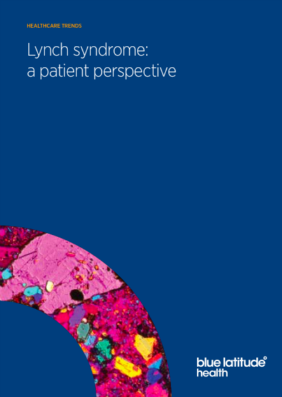Lynch syndrome: a patient perspective
February 8, 2018 | Genetic, HCP, HNPCC, Lynch Syndrome, Patient-centric, Pharma, oncology, patient
Blue Latitude Health intern Costantino Ciotti gives an insight into life with Lynch Syndrome, a genetic condition associated with colon cancer. Here he explores the patient’s perspective, including treatment options, and gives his advice for healthcare professionals diagnosing patients with a genetic disease.
My grandfather was probably the first in the family to be afflicted with Lynch syndrome or Hereditary Nonpolyposis Colorectal Cancer (HNPCC).
The autosomal dominant genetic condition is associated with a genetic predisposition to colon cancer, as well as other cancers such as endometrial, stomach, ovary, small intestine, hepatobiliary tract, upper urinary tract, brain, and skin.
The majority of colorectal cancers are sporadic and 3 to 5 percent of all cases are thought to be due to Lynch syndrome. It is one of the most common hereditary cancer syndromes and it is estimated one in every 300 people is a carrier of the alteration in the gene.
Unfortunately, scientific development on genetics during my grandfather’s time was not sufficient enough and his cancer was seen as spontaneous. After being treated a few times, the cancer came back twice and the second time he did not make it. However, when my father was affected by his first cancer in his early 30’s, he didn’t assume it was by random chance.
As a young public doctor at the time, he was climbing the career ladder at the World Health Organization and luckily encountered several geneticists whom he consulted with privately. After a few tests, his doctors concluded he had inherited HNPCC through his father and was suffering the same consequences.
A revolutionary discovery
For my father, the cancer came back four more times. However, with this new information, each incidence could be better controlled and diagnosed than the last. Now he consults Annika Lindblom Lynch syndrome Lead Expert Geneticist at the Karolinska Institute in Stockholm.Annika has dedicated her life to the study and treatment of hereditary colon cancers.
It was Annika who discovered the gene for Lynch syndrome. This was a remarkable breakthrough. In 2014, Annika was awarded the Stockholm County Research Council’s prize for her clinical research findings, in which she combined first-class molecular research with clinical management and essentially eliminated colon cancer as a cause of death in families where half their members previously died for the disease.
How is Lynch syndrome inherited?
Lynch syndrome can be inherited at birth if the MLH1, MSH2, and MSH6 genes have been copied. The PMS2 mismatch repair gene can also be tested for – this is a heterozygous germline mutation, which causes Lynch syndrome. The mutation is more likely to be diagnosed at a young age and those affected are likely to develop multiple types of cancers throughout their lifetime.
There is a 50% chance of inheriting the genes from the afflicted parent. Diagnosis of Lynch syndrome is achieved through genetic testing on a tissue sample (biopsy) or on blood targeting the aforementioned genes. If a genetic test is positive, the patient will have to increase the frequency of regular bowel screening.
The Amsterdam and Bethesda criteria can be used as a set of diagnosis measures to help identify families likely to have Lynch syndrome. Unfortunately, the syndrome can affect individuals even if they don’t have a family history of bowel and womb cancers, as some may be the first in their family to get it.
Taking a proactive approach
Annika set a program for my father and I, including regular annual checks through colonoscopies, tissue and blood samples. This means cancerous polyps can be detected at an early stage and removed on the spot, completely cancelling the tumour development.

Download the full article from Blue Latitude Health
This content was provided by Blue Latitude Health




